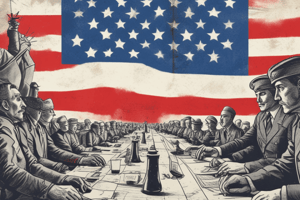Podcast
Questions and Answers
Who sent the Long Telegram in 1946 from Moscow?
Who sent the Long Telegram in 1946 from Moscow?
George Kennan
What policy was aimed to prevent the spread of communism?
What policy was aimed to prevent the spread of communism?
Containment policy
What did Winston Churchill refer to as the 'Iron Curtain'?
What did Winston Churchill refer to as the 'Iron Curtain'?
The division between Communist and Free Nations
What policy did Harry Truman implement to provide aid to countries struggling with communism?
What policy did Harry Truman implement to provide aid to countries struggling with communism?
What was the Atomic Energy Commission created to oversee?
What was the Atomic Energy Commission created to oversee?
What is the role of the CIA?
What is the role of the CIA?
What does the National Security Council do?
What does the National Security Council do?
What was the Marshall Plan?
What was the Marshall Plan?
What was agreed upon in the General Agreement on Tariffs and Trade?
What was agreed upon in the General Agreement on Tariffs and Trade?
Who was Douglas MacArthur?
Who was Douglas MacArthur?
What was the Berlin Blockade?
What was the Berlin Blockade?
What is NATO?
What is NATO?
What happened to the Peoples Republic of China after the Civil War?
What happened to the Peoples Republic of China after the Civil War?
Where did the old government of China go for exile?
Where did the old government of China go for exile?
What did NSC-68 call for?
What did NSC-68 call for?
What triggered the Korean War?
What triggered the Korean War?
What is the 38th parallel?
What is the 38th parallel?
What characterized the Cold War?
What characterized the Cold War?
What was the Southeast Asia Treaty Organization?
What was the Southeast Asia Treaty Organization?
What was the goal of the Central Treaty Organization?
What was the goal of the Central Treaty Organization?
Who was Walter Lippmann?
Who was Walter Lippmann?
What was Truman's Fair Deal?
What was Truman's Fair Deal?
What did Operation Dixie aim to achieve?
What did Operation Dixie aim to achieve?
What did the GI Bill provide for returning WWII soldiers?
What did the GI Bill provide for returning WWII soldiers?
What was the Taft-Hartley Act aimed at?
What was the Taft-Hartley Act aimed at?
Who was Jackie Robinson?
Who was Jackie Robinson?
What did the States Rights Democratic Party (Dixiecrats) oppose?
What did the States Rights Democratic Party (Dixiecrats) oppose?
Who was Hubert Humphrey?
Who was Hubert Humphrey?
Who was Strom Thurmond?
Who was Strom Thurmond?
What did 'To Secure These Rights' call for?
What did 'To Secure These Rights' call for?
Who were the Dixiecrats?
Who were the Dixiecrats?
Who was Henry A. Wallace?
Who was Henry A. Wallace?
What was the House Un-American Activities Committee's purpose?
What was the House Un-American Activities Committee's purpose?
What were the Hollywood Ten known for?
What were the Hollywood Ten known for?
Who was Alger Hiss?
Who was Alger Hiss?
Who were Julius and Ethel Rosenberg?
Who were Julius and Ethel Rosenberg?
Who was Joseph McCarthy?
Who was Joseph McCarthy?
What is McCarthyism?
What is McCarthyism?
What were the Army-McCarthy hearings?
What were the Army-McCarthy hearings?
Who was J. Edgar Hoover?
Who was J. Edgar Hoover?
What did the McCarran-Walter Act do?
What did the McCarran-Walter Act do?
What was Operation Wetback?
What was Operation Wetback?
Flashcards
Containment Policy
Containment Policy
A U.S. strategy to prevent Soviet expansion, limiting communism to where it already existed.
Iron Curtain
Iron Curtain
Ideological division separating communist Eastern Europe from democratic Western Europe.
Truman Doctrine
Truman Doctrine
U.S. policy to support countries resisting communism with aid and resources.
Atomic Energy Commission
Atomic Energy Commission
Signup and view all the flashcards
CIA
CIA
Signup and view all the flashcards
National Security Council
National Security Council
Signup and view all the flashcards
Marshall Plan
Marshall Plan
Signup and view all the flashcards
GATT (General Agreement on Tariffs and Trade)
GATT (General Agreement on Tariffs and Trade)
Signup and view all the flashcards
Berlin Blockade
Berlin Blockade
Signup and view all the flashcards
NATO
NATO
Signup and view all the flashcards
Taiwan
Taiwan
Signup and view all the flashcards
NSC-68
NSC-68
Signup and view all the flashcards
Korean War
Korean War
Signup and view all the flashcards
38th Parallel
38th Parallel
Signup and view all the flashcards
Cold War
Cold War
Signup and view all the flashcards
Fair Deal
Fair Deal
Signup and view all the flashcards
GI Bill
GI Bill
Signup and view all the flashcards
Taft-Hartley Act (1947)
Taft-Hartley Act (1947)
Signup and view all the flashcards
Jackie Robinson
Jackie Robinson
Signup and view all the flashcards
Dixiecrats
Dixiecrats
Signup and view all the flashcards
To Secure These Rights
To Secure These Rights
Signup and view all the flashcards
House Un-American Activities Committee
House Un-American Activities Committee
Signup and view all the flashcards
Hollywood Ten
Hollywood Ten
Signup and view all the flashcards
Alger Hiss
Alger Hiss
Signup and view all the flashcards
Julius and Ethel Rosenberg
Julius and Ethel Rosenberg
Signup and view all the flashcards
Joseph McCarthy
Joseph McCarthy
Signup and view all the flashcards
McCarthyism
McCarthyism
Signup and view all the flashcards
Army-McCarthy Hearings
Army-McCarthy Hearings
Signup and view all the flashcards
J. Edgar Hoover
J. Edgar Hoover
Signup and view all the flashcards
McCarran-Walter Act
McCarran-Walter Act
Signup and view all the flashcards
Study Notes
George Kennan
- Authored the Long Telegram in 1946 from Moscow, highlighting the Soviet Union's unwillingness to be treated as a normal state.
- Advocated for containment of communism as the primary U.S. strategy to thwart Soviet expansion.
Containment Policy
- Formulated to curb the spread of communism.
- Initiated by the Truman Administration and influenced by Kennan's ideas.
Iron Curtain
- Coined by Winston Churchill in a Missouri speech, signifying the ideological divide between communist Eastern Europe and democratic Western nations.
Truman Doctrine
- Established by Harry Truman to provide support and aid to countries resisting communism.
Atomic Energy Commission
- Formed in 1946 to manage research and production of atomic energy and weapons.
CIA
- Created to gather intelligence and conduct covert operations outside the U.S.
National Security Council
- Advises the President on matters related to national security and foreign policies.
Marshall Plan
- Initiated by Secretary of State George C. Marshall, this program allocated billions to reconstruct war-torn European economies, proving to be highly effective.
General Agreement on Tariffs and Trade (GATT)
- Agreement among 23 Western nations to foster international trade by reducing tariffs, significantly benefiting the U.S. economy.
Douglas MacArthur
- U.S. General and Supreme Commander in Japan until 1948; oversaw Japan’s transition to a democratic government and disarmament.
Berlin Blockade
- Soviet action in 1948-49 barring access to West Berlin, prompting the U.S. and allies to airlift supplies.
NATO
- Military alliance between the U.S., Canada, and ten Western European nations, established for collective defense against Soviet aggression.
Peoples Republic of China
- Established by communists under Mao Zedong; the U.S. refused to recognize this regime, supporting the ousted Nationalist government instead.
Taiwan
- The island where the Nationalist government of China retreated after losing the civil war to communists.
NSC-68
- A 1950 National Security Council document advocating a significant buildup of U.S. military capabilities against global communism.
Korean War
- Initiated by North Korea's invasion of South Korea in 1950; resulted in a prolonged conflict ending in a stalemate, with no formal peace treaty.
38th Parallel
- The dividing line between North and South Korea, established post-World War II.
Cold War
- A prolonged geopolitical tension between the U.S. and the Soviet Union, characterized by ideological, military, and cultural confrontations without direct warfare.
Southeast Asia Treaty Organization (SEATO)
- Alliance formed among Western nations to collectively confront and combat communism in Asia.
Central Treaty Organization (CENTO)
- Alliance aimed at countering Soviet influence in the Middle East.
Walter Lippmann
- Noted journalist who cautioned against viewing foreign policy as an ideological crusade, arguing for a more pragmatic approach.
Fair Deal
- Domestic policy agenda proposed by Truman to address social welfare, healthcare, housing, and education, enhancing the living standards of Americans post-WWII.
Operation Dixie
- Campaign by labor unions in the South to promote unionization, targeting industries like textiles and agriculture.
GI Bill
- Legislation providing veterans with benefits for education, housing, and business ventures post-WWII.
Taft-Hartley Act (1947)
- Legislation aimed at curbing labor unions' powers; enforced an 80-day cooling-off period for strikes and limited union membership requirements.
Jackie Robinson
- Broke Major League Baseball's color barrier as the first African American player, playing for the Brooklyn Dodgers.
States Rights Democratic Party (Dixiecrats)
- Opposed civil rights and integration, advocating for states' freedoms; nominated Strom Thurmond for presidency.
Hubert Humphrey
- Progressive politician from Minneapolis, significantly influencing the Democratic platform and civil rights movement in 1948.
Strom Thurmond
- Leader of the Dixiecrats, ran for president advocating for states' rights and segregation.
To Secure These Rights
- 1948 report by the Commission on Civil Rights urging the federal government to eliminate segregation and ensure equal rights.
Dixiecrats
- Southern Democrats who formed to oppose civil rights; framed their stance as a protection of state liberties.
Henry A. Wallace
- Liberal former Vice President advocating for social welfare and international peace, supported by leftist factions, including communists.
House Un-American Activities Committee
- Established in 1947, it conducted hearings to investigate communist influences in America, notably targeting Hollywood figures.
Hollywood Ten
- A group of filmmakers who refused to testify about alleged communist ties, resulting in jail terms and blacklisting in Hollywood.
Alger Hiss
- High-ranking State Department official accused by Richard Nixon of espionage; his trial was a significant event in the Red Scare.
Julius and Ethel Rosenberg
- Convicted of providing atomic secrets to the Soviets during WWII, resulting in controversial death sentences.
Joseph McCarthy
- Senator notorious for unfounded accusations of communist infiltration in the U.S. government, notably within the State Department.
McCarthyism
- Refers to the era of intense anti-communism led by McCarthy, characterized by baseless accusations and abuses of power.
Army-McCarthy Hearings
- Televised hearings revealing McCarthy's questionable tactics and leading to his eventual discrediting.
J. Edgar Hoover
- FBI Director who exploited anti-communism to expand FBI powers, surveilling numerous Americans, including political dissidents.
McCarran-Walter Act
- 1952 immigration law maintaining quotas and allowing deportation of individuals identified as communists, enacted over Truman's veto.
Operation Wetback
- Government initiative targeting illegal immigration from Mexico, resulting in the deportation of over a million individuals.
Studying That Suits You
Use AI to generate personalized quizzes and flashcards to suit your learning preferences.




